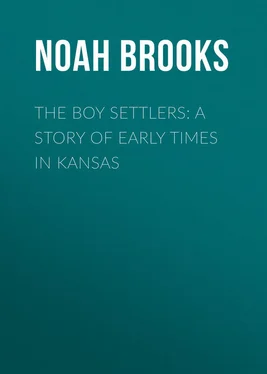Noah Brooks - The Boy Settlers - A Story of Early Times in Kansas
Здесь есть возможность читать онлайн «Noah Brooks - The Boy Settlers - A Story of Early Times in Kansas» — ознакомительный отрывок электронной книги совершенно бесплатно, а после прочтения отрывка купить полную версию. В некоторых случаях можно слушать аудио, скачать через торрент в формате fb2 и присутствует краткое содержание. Жанр: foreign_antique, foreign_prose, foreign_children, на английском языке. Описание произведения, (предисловие) а так же отзывы посетителей доступны на портале библиотеки ЛибКат.
- Название:The Boy Settlers: A Story of Early Times in Kansas
- Автор:
- Жанр:
- Год:неизвестен
- ISBN:нет данных
- Рейтинг книги:5 / 5. Голосов: 1
-
Избранное:Добавить в избранное
- Отзывы:
-
Ваша оценка:
- 100
- 1
- 2
- 3
- 4
- 5
The Boy Settlers: A Story of Early Times in Kansas: краткое содержание, описание и аннотация
Предлагаем к чтению аннотацию, описание, краткое содержание или предисловие (зависит от того, что написал сам автор книги «The Boy Settlers: A Story of Early Times in Kansas»). Если вы не нашли необходимую информацию о книге — напишите в комментариях, мы постараемся отыскать её.
The Boy Settlers: A Story of Early Times in Kansas — читать онлайн ознакомительный отрывок
Ниже представлен текст книги, разбитый по страницам. Система сохранения места последней прочитанной страницы, позволяет с удобством читать онлайн бесплатно книгу «The Boy Settlers: A Story of Early Times in Kansas», без необходимости каждый раз заново искать на чём Вы остановились. Поставьте закладку, и сможете в любой момент перейти на страницу, на которой закончили чтение.
Интервал:
Закладка:
“We had no difficulty getting across at Parkville,” said Mr. Bryant, “except that we did have to go over in the night in a sneaking fashion that I did not like.”
“Well,” answered the stranger, “as a special favor, they let us across, seeing that we had had such hard luck. That’s a nice-looking fiddle you’ve got there, sonny,” he abruptly interjected, as he took Oscar’s violin from his unwilling hand. “I used to play the fiddle once, myself,” he added. Then, drawing the bow over the strings in a light and artistic manner, he began to play “Bonnie Doon.”
“Come, John,” his wife said wearily, “it’s time the children were under cover. Let go the fiddle until we’ve had supper.”
John reluctantly handed back the violin, and the newcomers were soon in the midst of their preparations for the night’s rest. Later on in the evening, John Clark, as the head of the party introduced himself, came over to the Dixon camp, and gave them all the news. Clark was one of those who had been helped by the New England Emigrant Aid Society, an organization with headquarters in the Eastern States, and with agents in the West. He had been fitted out at Council Bluffs, Iowa, but for some unexplained reason had wandered down as far south as Kansas City, and there had boarded the “Black Eagle” with his family and outfit. One of the two men with him was his brother; the other was a neighbor who had cast in his lot with him. The tall lad was John Clark’s nephew.
In one way or another, Clark had managed to pick up much gossip about the country and what was going on. At Tecumseh, where they would be due in a day or two if they continued on this road, an election for county officers was to be held soon, and the Missourians were bound to get in there and carry the election. Clark thought they had better not go straight forward into danger. They could turn off, and go west by way of Topeka.
“Why, that would be worse than going to Tecumseh,” interjected Charlie, who had modestly kept out of the discussion. “Topeka is the free-State capital, and they say that there is sure to be a big battle there, sooner or later.”
But Mr. Bryant resolved that he would go west by the way of Tecumseh, no matter if fifty thousand Borderers were encamped there. He asked the stranger if he had in view any definite point; to which Clark replied that he had been thinking of going up the Little Blue; he had heard that there was plenty of good vacant land there, and the land office would open soon. He had intended, he said, to go to Manhattan, and start from there; but since they had been so cowardly as to change the name of the place, he had “rather soured on it.”
“Manhattan?” exclaimed Charlie, eagerly. “Where is that place? We have asked a good many people, but nobody can tell us.”
“Good reason why; they’ve gone and changed the name. It used to be Boston, but the settlers around there were largely from Missouri. The company were Eastern men, and when they settled on the name of Boston, it got around that they were all abolitionists; and so they changed it to Manhattan. Why they didn’t call it New York, and be done with it, is more than I can tell. But it was Boston, and it is Manhattan; and that’s all I want to know about that place.”
Mr. Bryant was equally sure that he did not want to have anything to do with a place that had changed its name through fear of anybody or anything.
Next day there was a general changing of minds, however. It was Sunday, and the emigrants, a God-fearing and reverent lot of people, did not move out of camp. Others had come in during the night, for this was a famous camping-place, well known throughout all the region. Here were wood, water, and grass, the three requisites for campers, as they had already found. The country was undulating, interlaced with creeks; and groves of black-jack, oak, and cottonwood were here and there broken by open glades that would be smiling fields some day, but were now wild native grasses.
There was a preacher in the camp, a good man from New England, who preached about the Pilgrim’s Progress through the world, and the trials he meets by the way. Oscar pulled his father’s sleeve, and asked why he did not ask the preacher to give out “The Kansas Emigrant’s Song” as a hymn. Mr. Bryant smiled, and whispered that it was hardly likely that the lines would be considered just the thing for a religious service. But after the preaching was over, and the little company was breaking up, he told the preacher what Oscar had said. The minister’s eyes sparkled, and he replied, “What? Have you that beautiful hymn? Let us have it now and here. Nothing could be better for this day and this time.”
Oscar, blushing with excitement and native modesty, was put up high on the stump of a tree, and, violin in hand, “raised the tune.” It was grand old “Dundee.” Almost everybody seemed to know the words of Whittier’s poem, and beneath the blue Kansas sky, amid the groves of Kansas trees, the sturdy, hardy men and the few pale women joyfully, almost tearfully, sang,–
We’ll tread the prairie as of old
Our fathers sailed the sea,
And make the West, as they the East,
The homestead of the free!
No pause, nor rest, save where the streams
That feed the Kansas run,
Save where our pilgrim gonfalon
Shall flout the setting sun!
Upbearing, like the Ark of old,
The Bible in our van,
We go to test the truth of God
Against the fraud of man.
We go to plant her common schools
On distant prairie swells,
And give the Sabbaths of the wild
The music of her bells.
We’re flowing from our native hills
As our free rivers flow;
The blessing of our Mother-land
Is on us as we go.
We go to rear a wall of men
On freedom’s Southern line,
And plant beside the cotton-tree
The rugged Northern pine!
We crossed the prairie, as of old
The pilgrims crossed the sea,
To make the West, as they the East,
The homestead of the free!
“It was good to be there,” said Alexander Howell, his hand resting lovingly on Oscar’s shoulder, as they went back to camp. But Oscar’s father said never a word. His face was turned to the westward, where the sunlight was fading behind the hills of the far-off frontier of the Promised Land.
The general opinion gathered that day was that they who wanted to fight for freedom might better go to Lawrence, or to Topeka. Those who were bent on finding homes for themselves and little ones should press on further to the west, where there was land in plenty to be had for the asking, or, rather, for the pre-empting. So, when Monday morning came, wet, murky, and depressing, Bryant surrendered to the counsels of his brother-in-law and the unspoken wish of the boys, and agreed to go on to the newly-surveyed lands on the tributaries of the Kaw. They had heard good reports of the region lying westward of Manhattan and Fort Riley. The town that had changed its name was laid out at the confluence of the Kaw and the Big Blue. Fort Riley was some eighteen or twenty miles to the westward, near the junction of the streams that form the Kaw, known as Smoky Hill Fork and the Republican Fork. On one or the other of these forks, the valleys of which were said to be fertile and beautiful beyond description, the emigrants would find a home. So, braced and inspired by the consciousness of having a definite and settled plan, the Dixon party set forth on Monday morning, through the rain and mist, with faces to the westward.
CHAPTER VI.
WESTWARD HO!
The following two or three days were wet and uncomfortable. Rain fell in torrents at times, and when it did not rain the ground was steamy, and the emigrants had a hard time to find spots dry enough on which to make up their beds at night. This was no holiday journey, and the boys, too proud to murmur, exchanged significant nods and winks when they found themselves overtaken by the discomforts of camping and travelling in the storm. For the most part, they kept in camp during the heaviest of the rain. They found that the yokes of the oxen chafed the poor animals’ necks when wet.
Читать дальшеИнтервал:
Закладка:
Похожие книги на «The Boy Settlers: A Story of Early Times in Kansas»
Представляем Вашему вниманию похожие книги на «The Boy Settlers: A Story of Early Times in Kansas» списком для выбора. Мы отобрали схожую по названию и смыслу литературу в надежде предоставить читателям больше вариантов отыскать новые, интересные, ещё непрочитанные произведения.
Обсуждение, отзывы о книге «The Boy Settlers: A Story of Early Times in Kansas» и просто собственные мнения читателей. Оставьте ваши комментарии, напишите, что Вы думаете о произведении, его смысле или главных героях. Укажите что конкретно понравилось, а что нет, и почему Вы так считаете.












